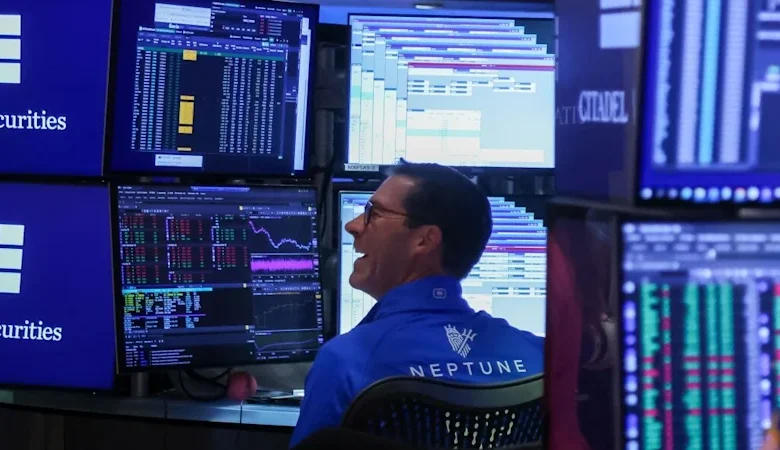ASX jumps as retailers, banks rise ahead of CPI report; Temple & Webster tanks

“A potential peace deal may reduce the geopolitical risk premium and may trigger some profit-taking,” said Ole Hansen, head of commodity strategy at Saxo Bank. Stock market jitters initially sparked some selling in gold, but the negative impact was limited, he added.
Loading
Energy stocks also missed out on the morning rally after oil fell sharply overnight as signs of progress in peace talks between Ukraine and Russia buoyed expectations that Moscow’s supply will stay online. West Texas Intermediate futures fell as much as 2.6 per cent overnight in New York, before paring some of that decline. Oil and gas giant Woodside dropped 0.4 per cent, and Santos dropped 1 per cent.
On Wall Street overnight, the S&P 500 rose 0.9 per cent after breaking out of a morning lull and is back within 1.8 per cent of its all-time high. The Dow Jones Industrial Average was up 1.4 per cent, and the Nasdaq composite was 0.7 per cent higher.
The gains for indexes masked some big swings underneath the surface, particularly among stocks linked to the artificial-intelligence industry.
A report that Meta Platforms is in talks to use Google’s chips sent shares of its parent Alphabet soaring. The stock finished 1.6 per cent higher after jumping as much as 3.2 per cent, putting it on track to hit a $US4 trillion market capitalisation for the first time. Alphabet has added nearly $US1 trillion ($1.64 trillion) in market value since mid-October, helped by Warren Buffett taking a $US4.9 billion stake during the third quarter and broader Wall Street enthusiasm for its recently released Gemini AI model.
Rival chip companies dropped sharply after the report. Nvidia dropped 2.6 per cent and was the heaviest weight on the S&P 500 by far, while Advanced Micro Devices sank 4.2 per cent.
Chinese e-commerce giant Alibaba, meanwhile, saw its stock that trades in the United States fall 2.3 per cent after losing an early gain. It reported stronger revenue than analysts expected for the latest quarter thanks in part to the AI boom, but its overall profit fell short of forecasts.
Apple edged up 0.4 per cent amid a prediction it will reclaim its crown as the world’s largest smartphone maker from Samsung for the first time in more than a decade, lifted by the successful debut of its iPhone 17 and a rush of consumers upgrading devices, according to Counterpoint Research. The company is also benefiting from a cooling of US-China trade tensions and a depreciating US dollar that has boosted purchases in emerging markets, said Counterpoint Research.
Mixed profit reports also caused big swings for several retailers.
Loading
Abercrombie & Fitch soared 37.5 per cent after the apparel seller reported a stronger profit for the latest quarter than analysts expected. It also raised the bottom end of its forecasted range for revenue and profit over the full year. Kohl’s surged 42.3 per cent after reporting a profit for the latest quarter when analysts were expecting a loss.
Helping to keep the overall market calm were hopes that the Federal Reserve will cut its main interest rate at its next meeting in December. The Fed has already cut rates twice this year in hopes of shoring up a slowing economy, and lower interest rates can cover up a lot of sins in financial markets, including prices going too high.
A raft of data on the US economy left traders betting on a nearly 83 per cent probability that the Fed will cut in December, according to data from CME Group. That’s roughly the same as a day before and up sharply from the coin flip’s chance seen a week ago.
One report said that shoppers bought less at US retailers in September than economists expected. Another said confidence among US consumers worsened by more than economists expected in another potentially signal that the economy could use lower interest rates.
A third report, meanwhile, said that inflation at the wholesale level was a touch worse in September than economists expected, but a closely tracked underlying trend was slightly better. That’s important because lower interest rates can make inflation worse, and still-high inflation is the main deterrent that could push the Fed to hold off on more cuts.
After taking all the data together, several economists suggested the Fed and its chair, Jerome Powell, could be leaning toward cutting rates on December 10.
“Taking a pause on rate cuts would probably do more damage to sentiment than a cut would help,” according to Brian Jacobsen, chief economist at Annex Wealth Management, who also said “Powell doesn’t need to be the Grinch that stole Christmas.”
In the bond market, the yield on the 10-year Treasury eased to 4.01 per cent from 4.04 per cent late on Monday.
Easier interest rates can help stocks of smaller companies in particular, because of the need for many of them to borrow to grow. The Russell 2000 index of the smallest US stocks rose 1.9 per cent to lead the market.
In other international markets, indexes rose modestly across much of Europe and Asia.
with AP, Bloomberg
The Business Briefing newsletter delivers major stories, exclusive coverage and expert opinion. Sign up to get it every weekday morning.





